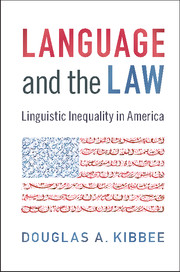Book contents
- Frontmatter
- Contents
- Preface
- Acknowledgments
- 1 Equality, Liberty, and Fairness in America
- 2 Language and Democracy
- 3 Linguistic Inequality in the Legal System
- 4 Language and Education
- 5 Government, Public Services, and the English-Only Movement
- 6 Language in the Workplace
- 7 Conclusions
- Bibliography
- Index of Court Cases
- Index of Names
- General Index
Preface
Published online by Cambridge University Press: 05 August 2016
- Frontmatter
- Contents
- Preface
- Acknowledgments
- 1 Equality, Liberty, and Fairness in America
- 2 Language and Democracy
- 3 Linguistic Inequality in the Legal System
- 4 Language and Education
- 5 Government, Public Services, and the English-Only Movement
- 6 Language in the Workplace
- 7 Conclusions
- Bibliography
- Index of Court Cases
- Index of Names
- General Index
Summary
The cover of this book represents the Pledge of Allegiance, recited by schoolchildren across the country, in its Arabic form. In January of 2013 the Cultural Arms Club of Rocky Mountain High School (Fort Collins, CO) read the pledge of allegiance in Arabic, one of many languages it used in an effort to break down cultural barriers. In March of 2015 a student at the Pine Bush High School in New York State recited this version. Both readings unleashed a firestorm of protest, with many websites and media outlets claiming that saying the pledge in Arabic forced students to embrace Islam. Christian Arabs as well as Muslims would use the same word, “Allah,” in the translation of the phrase “one nation under God.”
By design of the founding fathers of the United States, America does not have a national religion or a national language. Religious difference is explicitly protected in constitutional law, but linguistic difference is not. Linguistic inequalities affect an increasing number of Americans, from hundreds of linguistic backgrounds. Language and power are inextricably interconnected, with great potential for conflict and abuse, as the pages below will document.
The relation of language and power has been a focus of my work throughout my career. This research has explored how the preparation of grammars and dictionaries is related to political and social power, the relationship between French and English in England, and the elaboration and imposition of a standard language in France.
Most of my career has been devoted to studying this relationship between power and language relating to the use of French. In the early 1990s, I spent two summers in Quebec, at a time of great tension based largely on language. In 1994, I was teaching in France when the “Loi Toubon,” designed to protect the French language against English encroachment, was debated, passed, and in part declared in part unconstitutional. These experiences led me to wonder how linguistic difference was treated in my native United States, which in turn led to the organization of a conference, “Language Legislation and Linguistic Rights,” held at the University of Illinois in 1996 (selected papers published by John Benjamins, 1998). Subsequently, a series of reading groups with faculty and graduate students at the University of Illinois revealed the ubiquity of linguistic conflict and the variety of responses to it.
- Type
- Chapter
- Information
- Language and the LawLinguistic Inequality in America, pp. vii - ixPublisher: Cambridge University PressPrint publication year: 2016

